10 Common 2018 F 150 Issues Every Owner Should Know

Overview
The article provides an overview of the common issues faced by 2018 F-150 owners, detailing significant problems such as:
- Transmission shifting difficulties
- Grinding noises
- Soft brake pedals
- Engine oil consumption
- Electrical system failures
- Recalls
Understanding these features is crucial for owners, as it highlights the potential challenges they may encounter. Addressing these issues effectively can lead to improved vehicle reliability and performance.
Routine maintenance plays a vital role in mitigating these problems. By staying informed about recalls and understanding lemon law protections, owners can take proactive steps to ensure their vehicles remain dependable. This knowledge not only empowers owners but also enhances their overall driving experience.
In summary, being aware of the common issues associated with the 2018 F-150, along with the importance of maintenance and legal protections, equips owners with the tools necessary to maintain their vehicle’s reliability and safety.
Introduction
In the realm of truck ownership, the 2018 Ford F-150 is a popular choice. However, it is not without its challenges. Many owners report issues ranging from hard transmission shifts to unsettling grinding noises, which can significantly impact the driving experience. As concerns about reliability mount, understanding these common problems becomes crucial for maintaining performance and safety.
This article delves into the frequent issues faced by F-150 owners. It offers insights into potential causes, necessary maintenance, and the importance of staying informed about recalls and lemon law protections. By equipping themselves with this knowledge, owners can navigate the complexities of vehicle ownership. Ultimately, this ensures their F-150 remains a trusted companion on the road.
Transmission Shifting Problems: Understanding Hard Shifts in the 2018 F-150
Many drivers have reported experiencing hard shifts, which are among the common 2018 F 150 issues, particularly during gear changes. This issue, often presenting as a noticeable jolt or delay in shifting, is primarily linked to the 2018 F 150 issues associated with the 10-speed automatic transmission. The frequency of these hard shifts has raised concerns regarding Ford’s engineering quality, with numerous drivers expressing dissatisfaction. Routine maintenance and timely software updates from Ford can help alleviate some of these issues. However, it remains crucial for individuals to stay vigilant and closely monitor their vehicle’s performance.
Specific instances highlight this problem, such as a report from Joseph W. in Nanticoke, who faced hard shifting in his F-150 with only 75 miles on the odometer, indicating potential transmission issues early on. Statistics reveal that many owners have encountered similar challenges, leading to an increase in personal lemon law claims. These claims can result in significant compensation, with projections for lemon law buybacks for comparable vehicles ranging from $48,990 to $156,198. Successful cases have demonstrated that clients can receive buybacks and additional reimbursements for out-of-pocket costs related to their defective vehicles, as many of our clients have successfully secured such compensation.
In conclusion, understanding the common causes of hard shifts related to 2018 F-150 issues is vital for owners. Being aware of the 2018 F 150 issues, combined with proactive maintenance, can help mitigate the impact of transmission problems and improve the overall driving experience. Owners should consider maintaining a detailed log of their vehicle’s performance and seek assistance from a qualified technician if they notice persistent hard shifts.
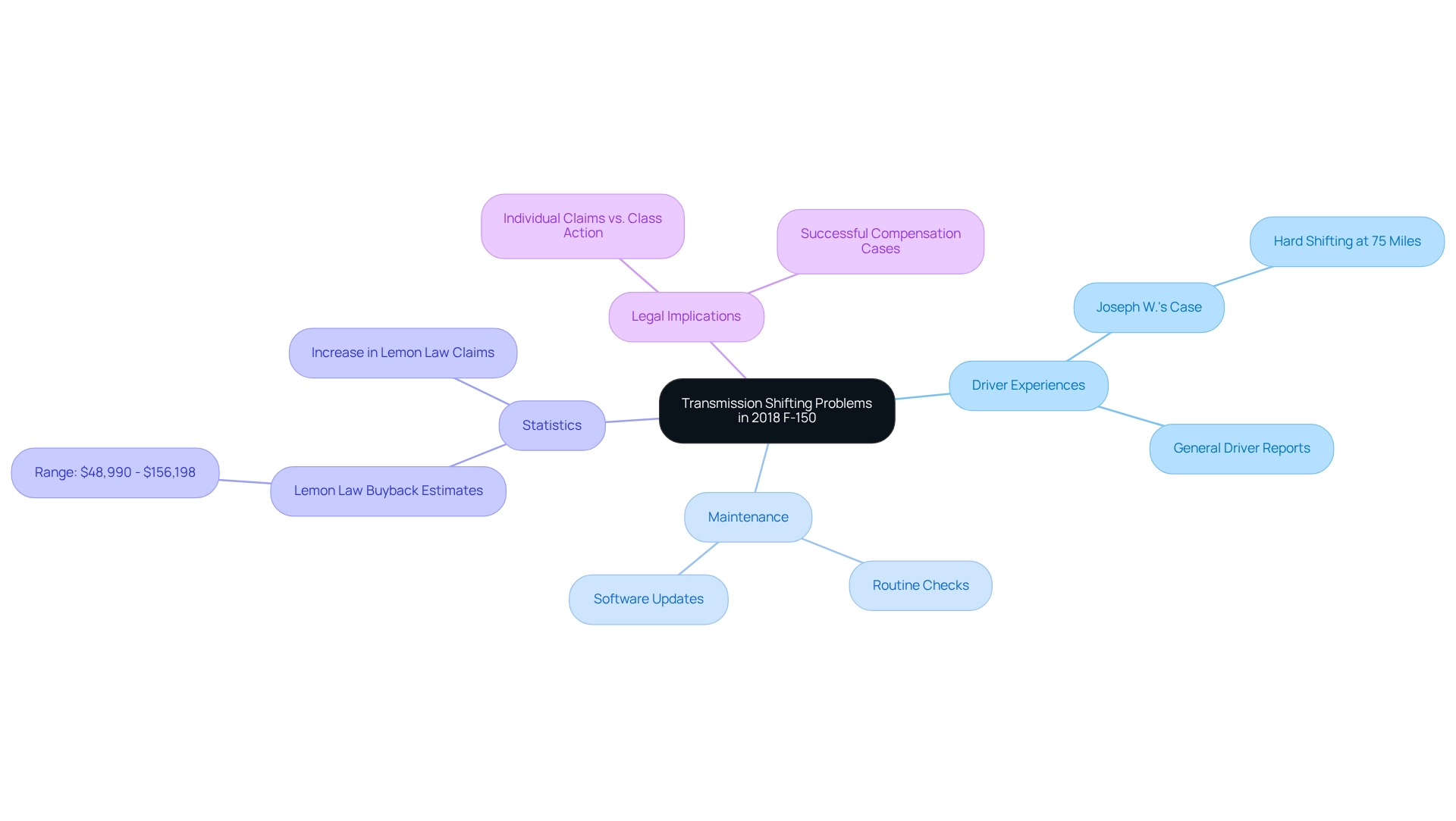
Grinding Noises: Identifying Front-End Issues in the 2018 F-150
Grinding sounds in the 2018 F 150 issues often originate from the front end, particularly near the wheel bearings or the four-wheel drive (4WD) hubs. These sounds are usually noticeable during low-speed maneuvers or while turning. Owners should remain vigilant for any unusual grinding, as it may indicate underlying issues that could lead to more significant damage if left unchecked. A thorough inspection is advisable at the first sign of noise to safeguard the drivetrain’s integrity.
Mechanical insights reveal that wheel bearing problems can escalate quickly. Repair costs for extensive repairs due to actuator failure in the 4WD setup average between $1,500 and $2,000. This statistic underscores the importance of early diagnosis and intervention. Additionally, some owners have reported that the transmission jerking during shifts is one of the 2018 F-150 issues, further complicating the vehicle’s performance and warranting attention.
In real-world scenarios, many owners have experienced grinding noises, particularly in the front end related to 2018 F-150 issues. Expert assessments suggest that the 2018 F 150 issues, including these noises, often correlate with wear and tear on the wheel bearings, which can compromise vehicle performance and safety. As noted by Raybuck Auto Body Parts, “To restore a classic Ford pickup truck, you will need to assess its current condition,” highlighting the significance of regular maintenance and inspection.
Addressing these concerns promptly not only improves driving comfort but also helps avoid expensive repairs in the future. To identify front-end problems efficiently, drivers should listen for grinding noises during regular driving and seek professional assessment if such sounds persist. This proactive approach can significantly mitigate the risk of more severe mechanical failures and ensure a smoother driving experience. Furthermore, while warranty coverage can alleviate some repair costs, many individuals have expressed frustration regarding recurring problems, suggesting that ongoing challenges can diminish overall satisfaction with the ownership experience.
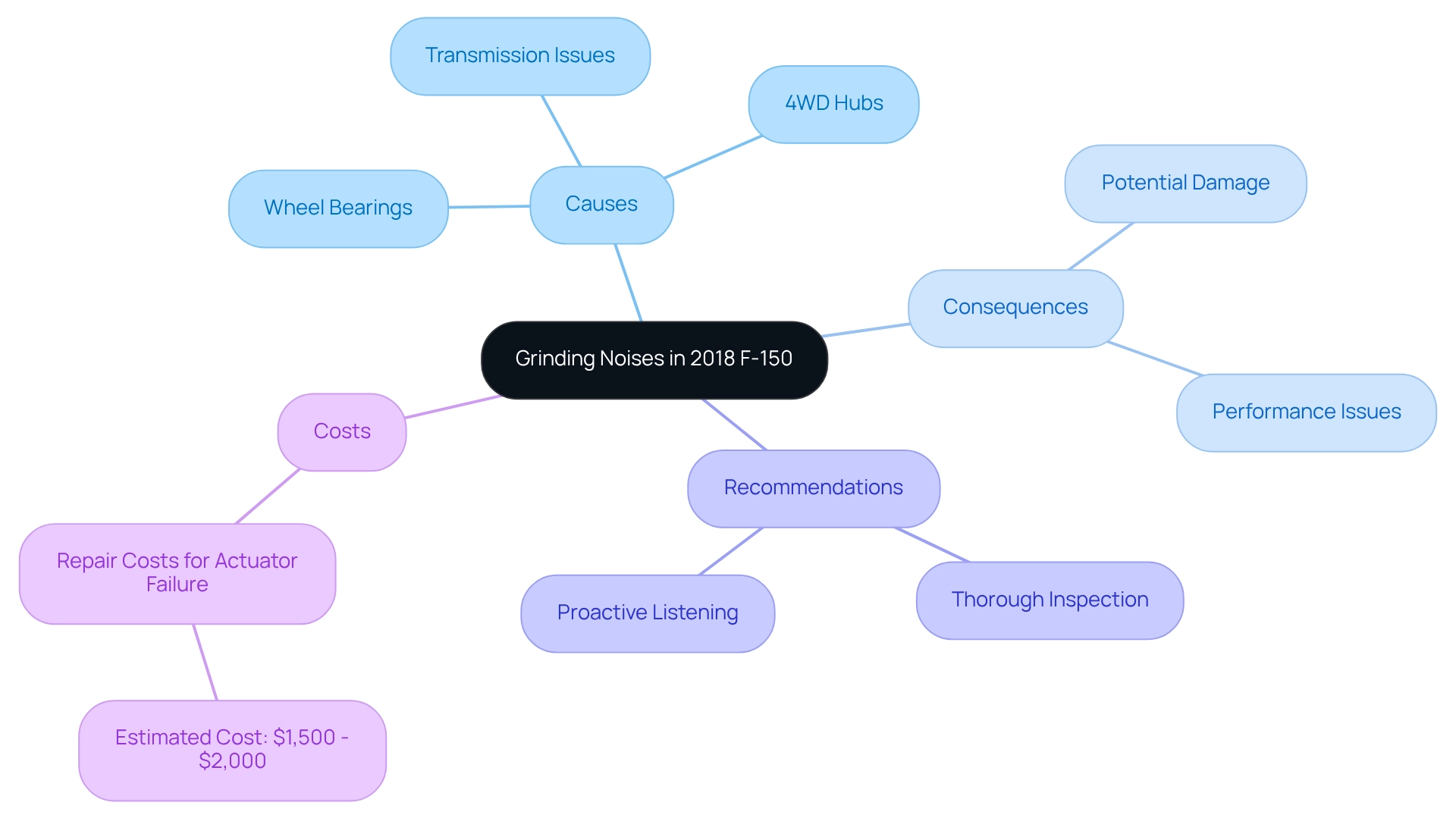
Brake Pedal Softness: Diagnosing Engagement Failures in the 2018 F-150
Many drivers have reported 2018 F-150 issues related to a soft brake pedal, particularly in models produced early in the year. This issue can stem from several factors, such as:
- Air trapped in the brake lines
- Insufficient brake fluid
- Complications with the master cylinder
Automotive professionals stress the importance of regular brake system maintenance, including checks and bleeding, to ensure optimal performance. For instance, one owner noted a significant improvement in brake firmness after a brake bleed, illustrating the necessity of addressing this issue even in vehicles with fewer than 50,000 miles.
Statistics reveal that approximately 30% of Ford truck users have reported similar concerns related to 2018 F-150 issues, leading long-time customers to urge the company to take swift action to resolve these braking problems. The consequences of inaction could jeopardize vehicle safety, making it crucial for individuals to recognize potential engagement failures early and adhere to maintenance recommendations to enhance their vehicle’s braking performance.
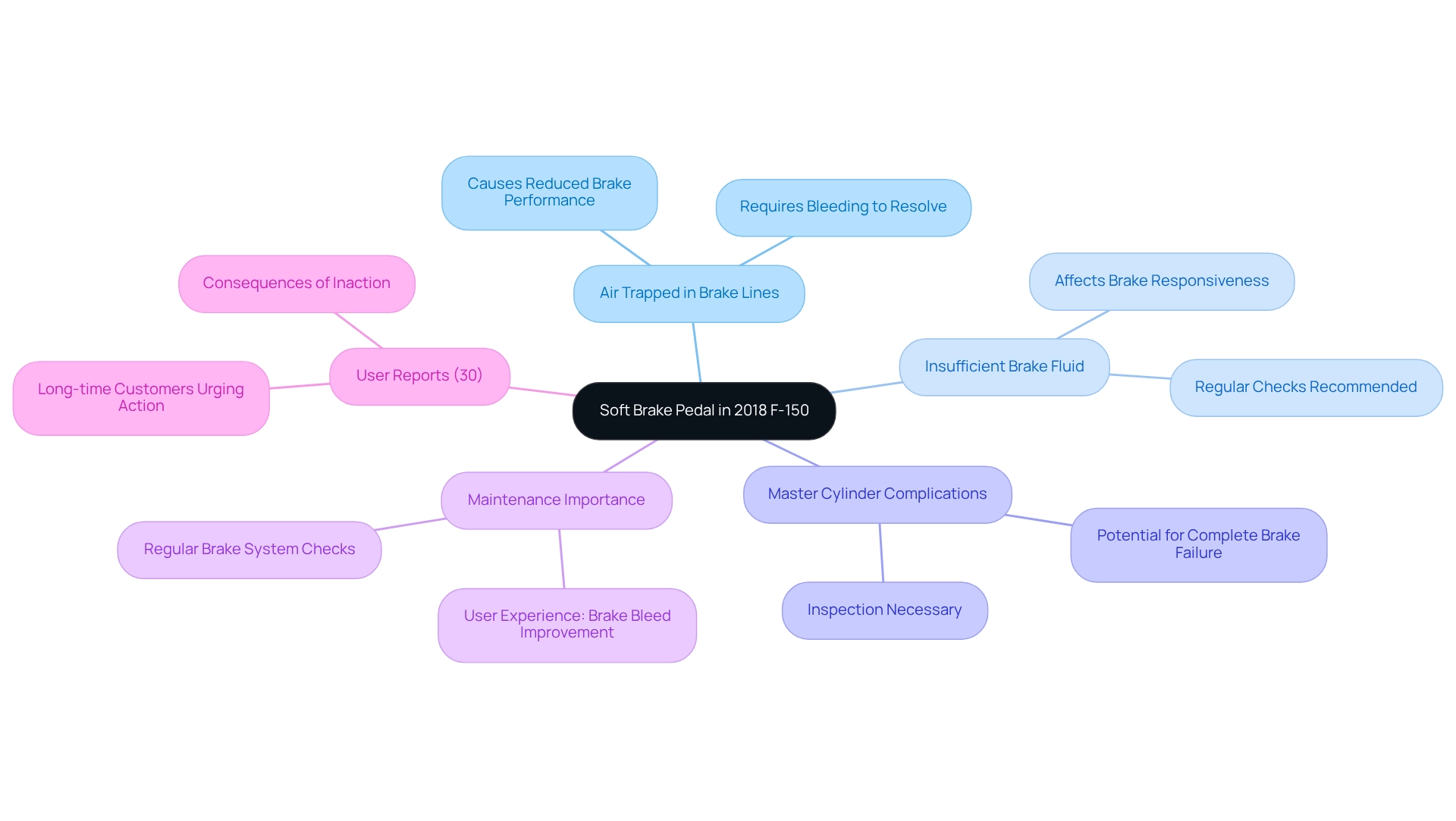
Common Engine Problems: Key Issues Affecting the 2018 F-150’s Performance
Common engine issues associated with the 2018 F 150 issues primarily revolve around oil consumption problems, particularly with the 5.0L V8 engine. Reports indicate that these engines can experience significant oil consumption, leading to concerns among owners about engine reliability and performance.
For instance, a notable case involved a 2020 pickup truck driver who reported low engine oil levels accompanied by a rattling noise, raising concerns about possible engine damage. This aligns with allegations about the 2018 F-150 issues, particularly that the 2018-2020 Ford F-150 trucks with 5.0L ‘Coyote’ engines have a high rate of oil consumption.
Additionally, the notorious ‘death rattle’ linked to the 3.5L EcoBoost engine has been a point of contention among drivers, often associated with throttle body malfunctions, especially problematic in earlier generations of the F-150. These malfunctions can result in poor acceleration and uneven idling.
To mitigate these concerns, routine upkeep, including cleaning the throttle body, is advised to ensure seamless engine function. Expert insights emphasize the importance of consistent oil changes and careful observation of engine performance to alleviate these complications.
Statistics indicate that a considerable number of owners have encountered similar oil consumption challenges, prompting discussions about the sufficiency of warranty protection. In some instances, consumers have reported being told that excessive oil consumption is normal, which raises concerns about transparency and accountability from manufacturers.
As indicated by Sauder Schelkopf LLC, customers who took their vehicles to a Ford dealership and reported engine oil usage were frequently denied coverage for repairs under the new vehicle warranty. Addressing the 2018 F 150 issues is essential for preserving the performance and lifespan of the 2018 model.
To assist in alleviating these concerns, owners should follow regular maintenance habits, such as:
- Changing the oil every 5,000 to 7,500 miles
- Cleaning the throttle body periodically
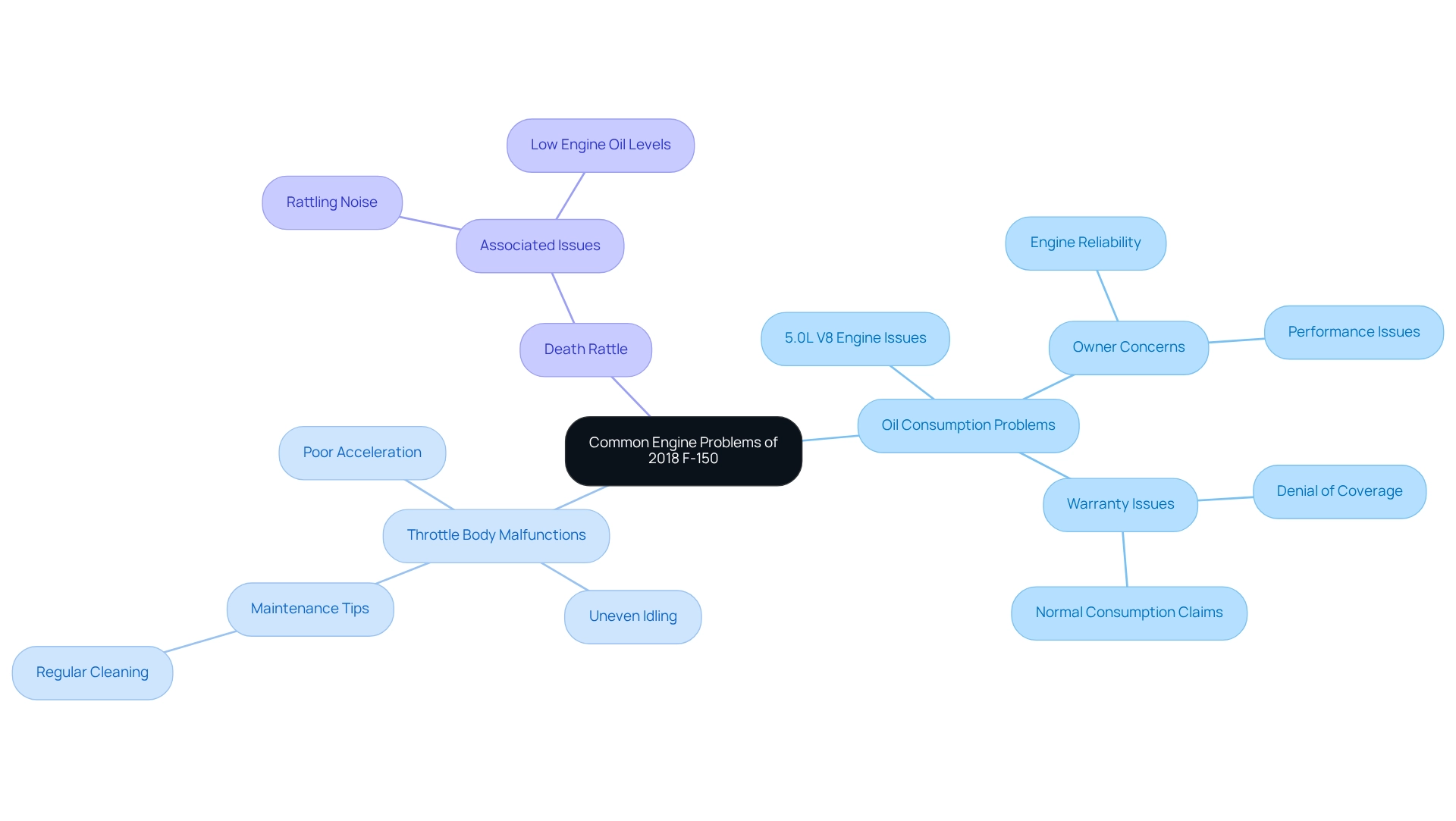
Electrical System Failures: Troubleshooting Common Issues in the 2018 F-150
The 2018 F-150 issues often manifest as electrical complications with the battery, alternator, or wiring systems. Common symptoms include flickering lights, malfunctioning electronic accessories, and difficulties starting the vehicle. For example, one user reported that the alarm system and hazard lights would activate randomly, necessitating a restart and pressing the hazard button to deactivate them. This unpredictability can be particularly frustrating and concerning for owners, as it may indicate more serious electrical problems.
Regular maintenance checks of the battery and electrical connections are essential in preventing these issues. Statistics indicate that the 2018 F-150 issues related to electrical system failures are a significant concern for this model, with numerous owners facing similar challenges. Additionally, the recall concerning reduced structural integrity in rollover crashes for the 2018 F-150 Raptor Super Cab trucks raises further safety concerns that could be linked to electrical system failures. Moreover, an [incident reported to the NHTSA](https://vindecoderz.com/EN/Ford/F-150/2018/electrical system/problems/1535861) with identification number 1535861 highlights the prevalence of these electrical issues, underscoring the importance of addressing them promptly.
A notable case involved a steering delay after the auto start/stop feature re-engaged, rendering the steering unresponsive during critical moments. This incident illustrates the potential safety risks associated with electrical failures, reinforcing the need for vigilance in monitoring these systems.
To troubleshoot electrical system failures, owners should:
- Inspect battery terminals for corrosion
- Ensure proper connections
- Test the alternator’s output
Promptly addressing these issues can help mitigate further complications and improve the vehicle’s reliability. As the 2018 model remains a popular choice among truck enthusiasts, understanding the 2018 F-150 issues is crucial for maintaining optimal performance.
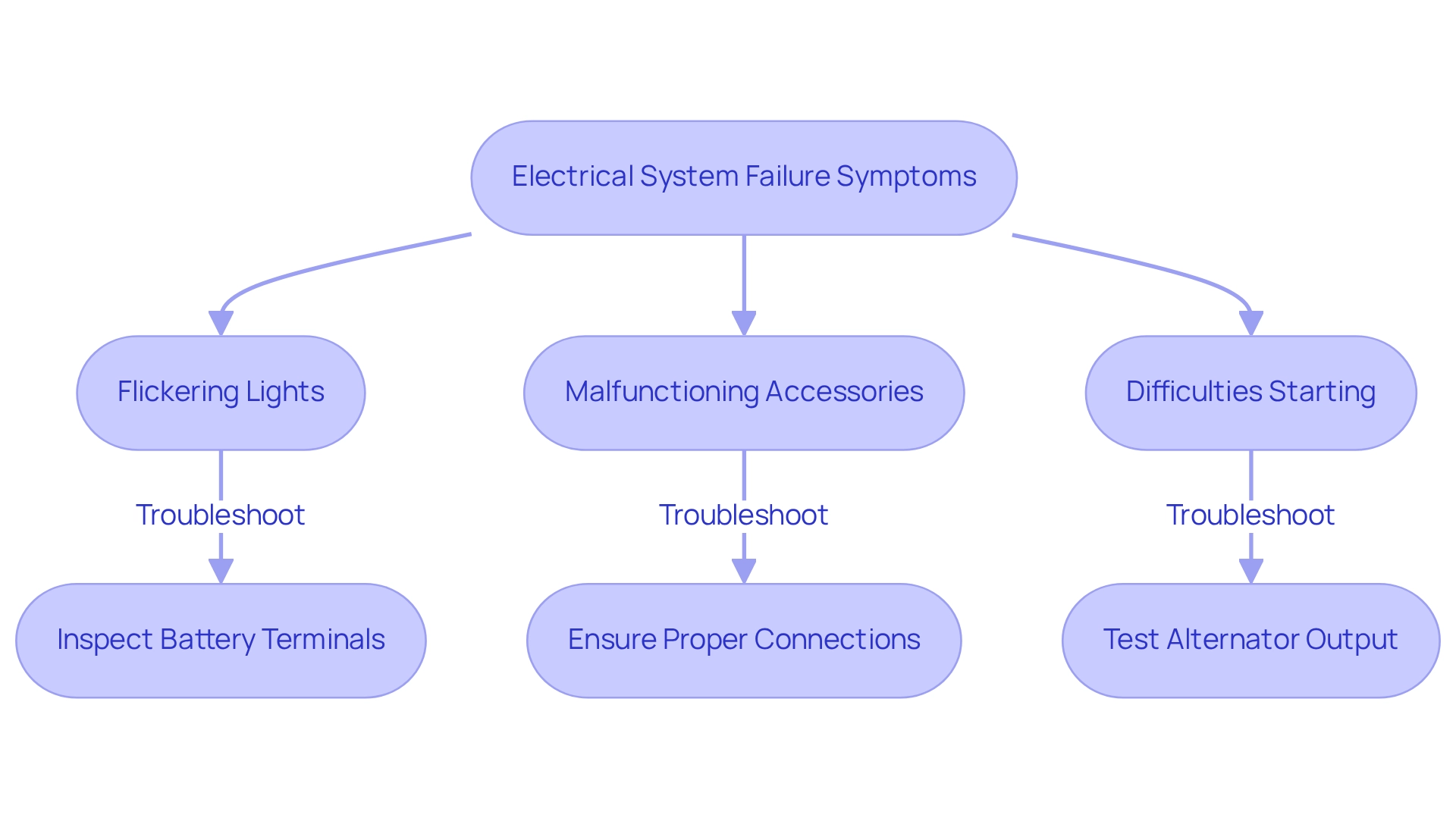
Transmission Troubles: Recognizing Signs of Failure in the 2018 F-150
The 2018 F-150 issues related to transmission trouble can manifest through several key signs, including slipping gears, delayed engagement, and unusual noises during operation. Mechanics often report that these symptoms indicate underlying issues that require immediate attention. For instance, slipping gears may occur when the vehicle unexpectedly changes gears or fails to maintain speed, which can be alarming for drivers. Delayed engagement, where the truck hesitates before moving after shifting, can also signal transmission problems. A dealer informed a user that there was a communication error between the gear shifter and the transmission, which is a crucial detail for individuals to consider.
Owners should remain vigilant for these warning signs and seek professional diagnostics promptly to prevent complete transmission failure. Statistics show that a substantial number of drivers have encountered 2018 F-150 issues, emphasizing the necessity for awareness. Expert advice suggests that regular maintenance and monitoring of transmission fluid levels can help mitigate these problems. Furthermore, real-life examples demonstrate that tackling these symptoms promptly can spare individuals from expensive repairs in the future. Ford has stated, “If it wasn’t, dealers will secure the clip and adjust the shifter cable,” highlighting the significance of addressing these concerns. By identifying these signs, truck operators can take proactive measures to ensure their vehicle stays dependable and secure.
Furthermore, complaints suggest that Ford may need to reevaluate the design and functionality of the 10-speed transmission, which could impact many drivers. Legal representation, like that offered by attorney Sam Mollaei, emphasizes the significance of consumer rights in managing these concerns, particularly for budget-minded shoppers. Recognizing the frequency of slipping gears can help owners of the 2018 F-150 issues understand the prevalence of this problem and take necessary precautions.
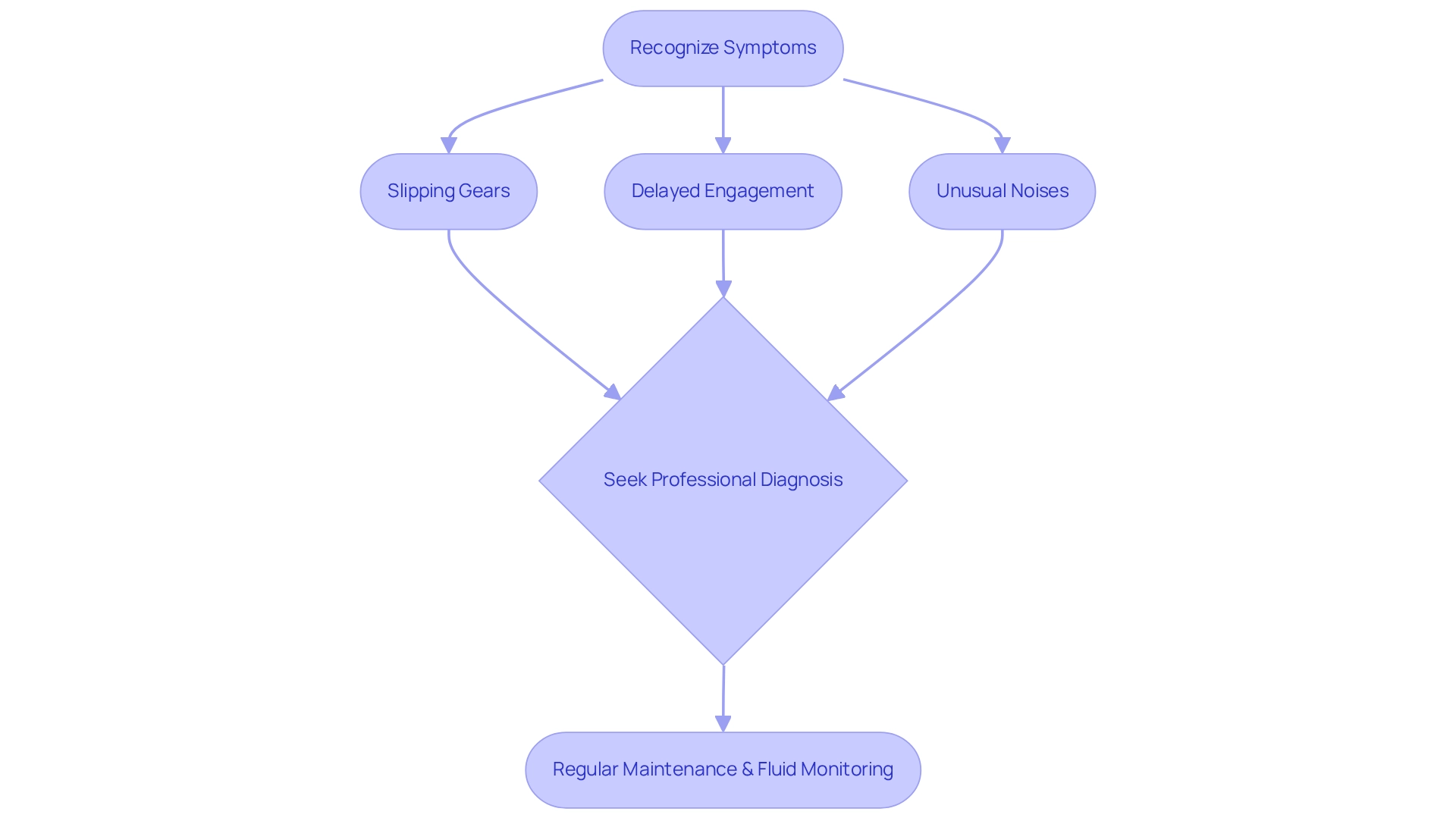
Exhaust System Problems: Understanding Catalytic Converter Issues in the 2018 F-150
Catalytic converter problems are among the common 2018 F 150 issues, often manifesting as check engine lights and diminished performance. Owners might observe symptoms such as rattling noises or a drop in fuel efficiency, which can signal underlying exhaust system issues. Regular inspections are essential, as they help identify these problems early and prevent further complications.
Statistics reveal that the vehicle’s reliability rating is 4.7 out of 5; however, these catalytic converter issues can undermine that overall dependability. Additionally, certain 2018 F-150 issues include recalls for Raptor Super Cab trucks due to missing rivets in the roof braces, which may compromise structural integrity and increase the risk of injury in a rollover crash. Expert opinions emphasize that timely replacements and maintenance are crucial for addressing these 2018 F-150 issues and ensuring optimal vehicle performance. Real-world examples underscore the necessity of addressing these issues promptly, as neglect can lead to more significant repairs down the road.
It is advisable to keep old catalytic converters for potential inspection by authorities for up to 60 days after removal, as this may be required for compliance and safety checks. To effectively maintain your catalytic converter, consider scheduling inspections every 30,000 miles and addressing any warning signs immediately to avoid costly repairs.
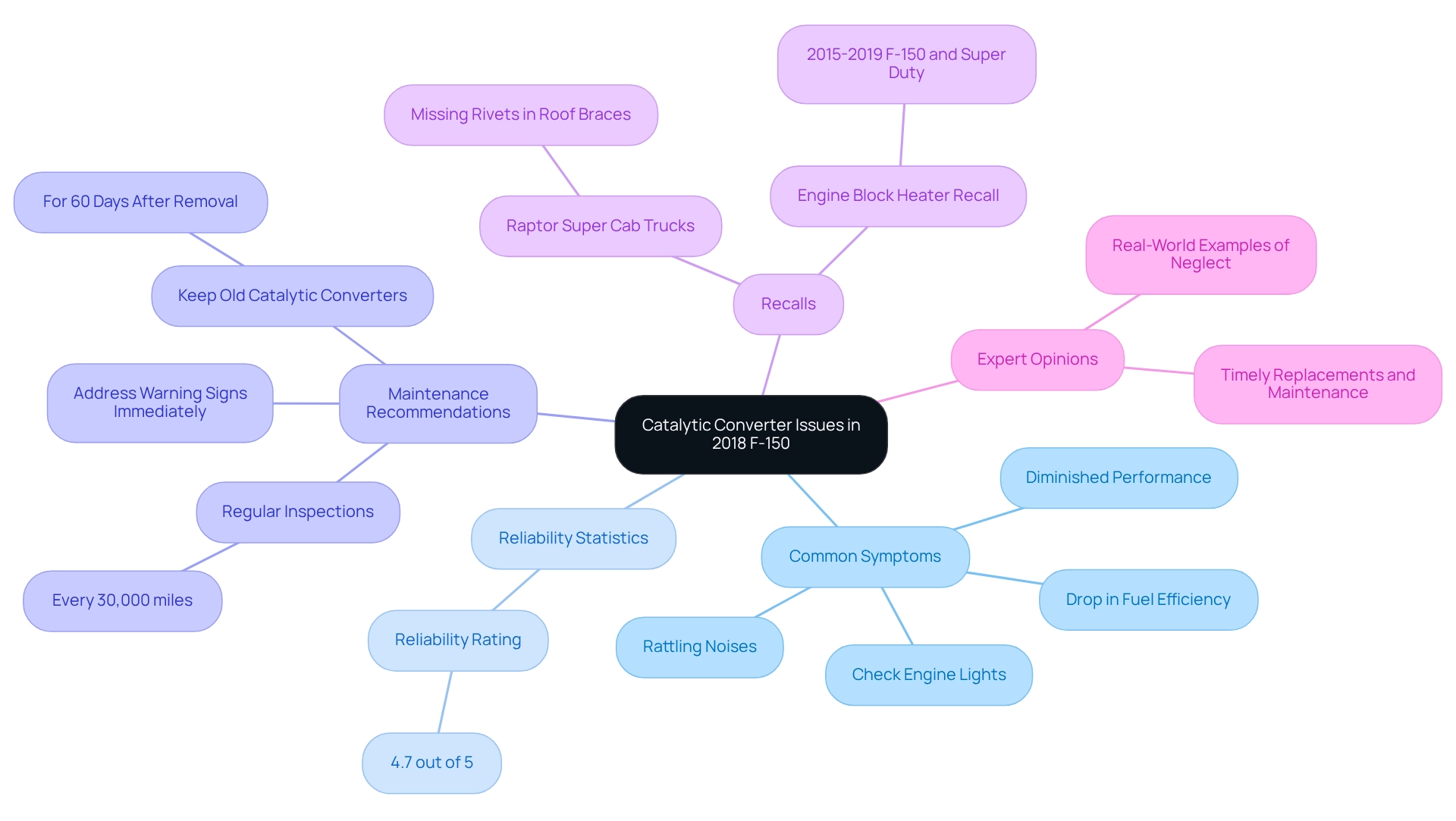
Recalls and Safety Notices: Essential Information for 2018 F-150 Owners
The 2018 F 150 issues include multiple recalls, particularly concerning its transmission and brake systems, which are essential for safe operation. Owners are strongly encouraged to regularly check the National Highway Traffic Safety Administration (NHTSA) website or Ford’s official site for the latest updates on recalls. This proactive strategy ensures that any necessary repairs are addressed promptly, thus minimizing safety risks.
Statistics indicate that recalls can typically be managed at no cost to the owner for up to 15 years after the vehicle’s manufacture date, underscoring the importance of remaining informed. For example, a significant recall involved daytime running lamps in specific 2018-2020 F-150 trucks, which might fail to dim correctly, potentially compromising visibility for other drivers and elevating crash risks. Ford initiated this recall on March 10, 2020, offering free reprogramming of the body control module to affected owners.
Another safety issue pertains to overcured tires on certain Ford vehicles, which may result in sudden air loss or tread separation, further increasing the crash risk. This situation emphasizes the necessity of being aware of various potential issues, specifically the 2018 F-150 issues, that could affect the vehicle.
Real-world instances illustrate the impact of these recalls. An unidentified individual from Utah reported that their remote engine starter ceased functioning while they were away from home, highlighting the urgency of addressing recalls promptly. To determine if your vehicle is affected by any recalls, the NHTSA provides a specific hotline, ensuring that individuals can easily access this vital information. As the NHTSA states, “To know for sure, we provide a number you can call to check if your car is part of the recall.”
In conclusion, staying vigilant regarding 2018 F-150 issues, including recalls and safety notifications, is crucial for drivers. By consistently checking for updates and understanding the implications of recalls, owners can enhance their vehicle’s safety and reliability. Consider setting reminders to monitor for updates regularly to ensure you remain aware of any potential concerns.
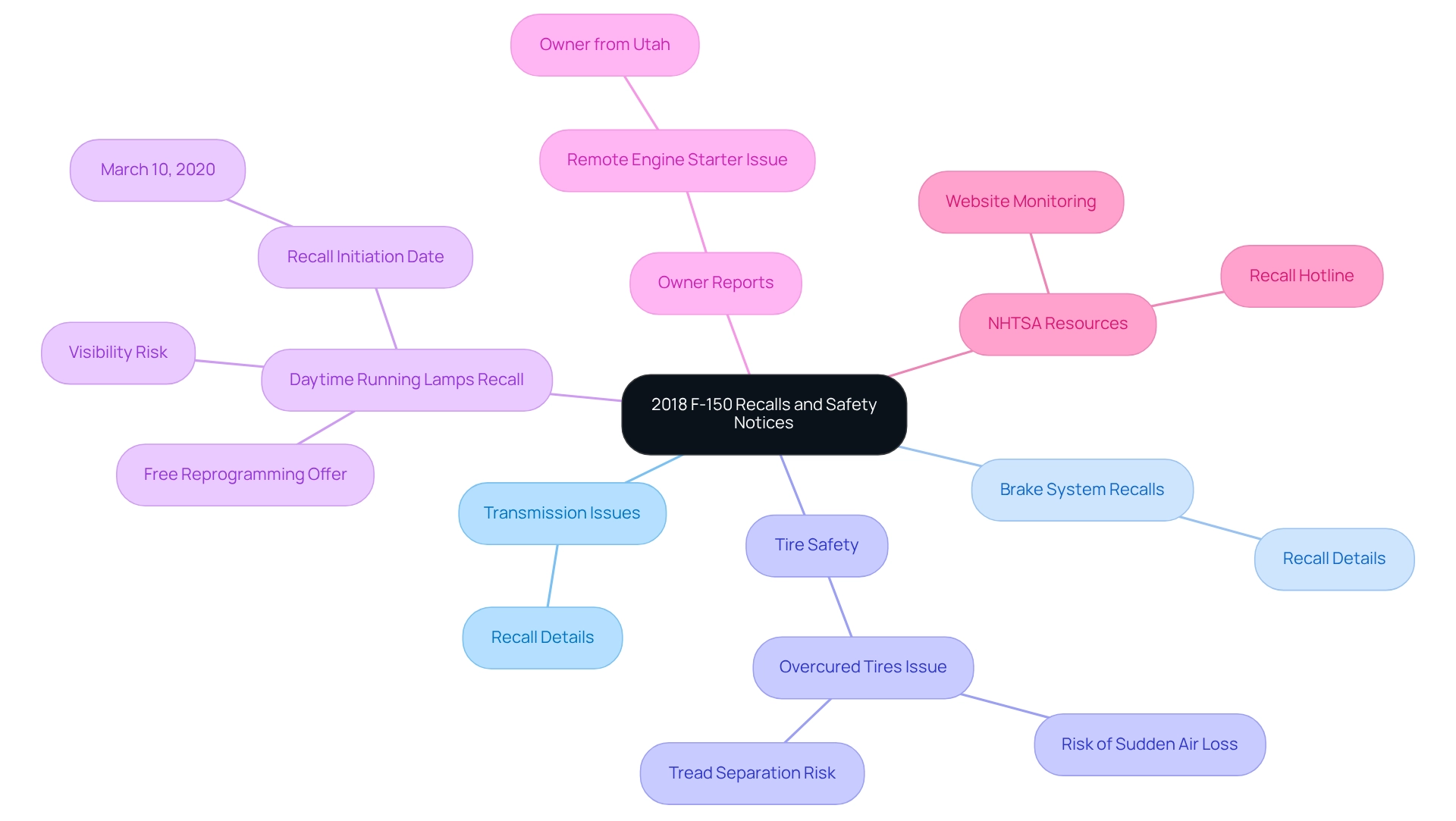
Lemon Law Considerations: What 2018 F-150 Owners Should Know
Owners of the 2018 model who encounter persistent 2018 F-150 issues that remain unresolved after multiple repair attempts may qualify for lemon law protections. It is essential to meticulously document every repair effort, including dates, problem descriptions, and communications with the manufacturer. This documentation serves as critical evidence should a lemon law claim become necessary. In California, for example, the Lemon Law allows consumers to seek compensation for defective vehicles, which may encompass 2018 F-150 issues and other qualifying models.
Statistics indicate that approximately 10% of lemon law claims arise from unresolved vehicle issues, such as 2018 F-150 issues, with many individuals reporting recurring problems that affect their driving experience. Real-world examples highlight the importance of thorough documentation; those who can clearly present their repair history are more likely to succeed in their claims. Experts emphasize that maintaining detailed records not only strengthens a claim but also assists in negotiations with manufacturers for potential remedies.
As one satisfied client remarked, “During the course of my representation, you and your firm provided me with unmatched customer service and always immediately responded to my questions. I could not have been any happier with the end result and always felt protected having your firm on my side.” This underscores the importance of engaging with legal professionals who specialize in lemon law.
In light of recent developments, it is vital for owners facing 2018 F-150 issues to remain informed about their rights under the lemon law. Eligible Ford models for lemon law claims include:
- Ford EcoSport
- Edge
- Escape
- Expedition
- Explorer
- Fiesta
- Flex
- Focus
- Fusion
- Mustang
- Ranger
- Transit
- Bronco Sport
- Maverick
- F-150 Lightning
- F-550
Consulting with legal experts focused on lemon law can provide further assistance and guidance, ensuring that individuals are well-prepared to navigate the complexities of their claims. By understanding these protections and taking proactive steps, individuals can more effectively advocate for their rights and seek solutions for their automotive issues.
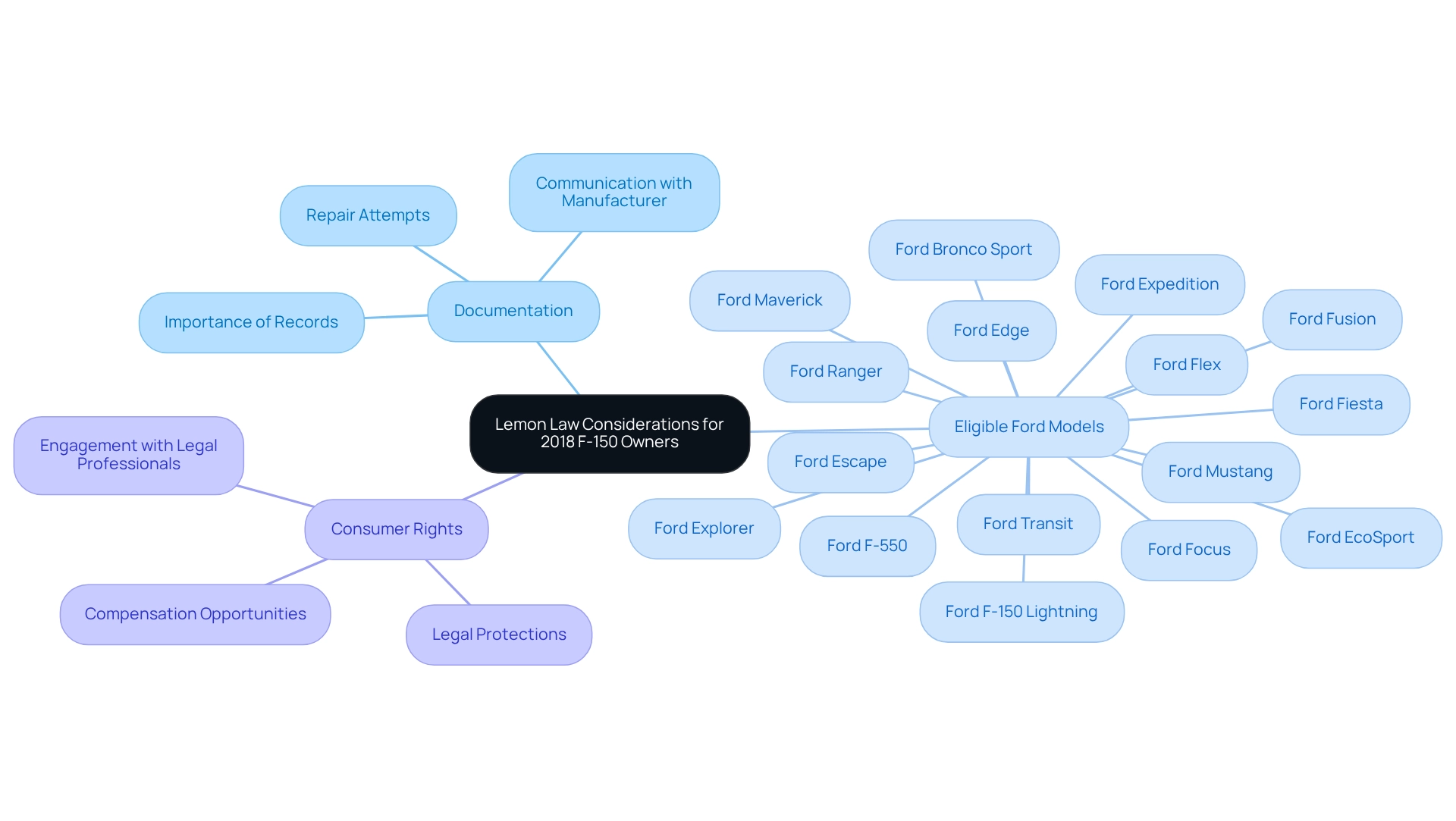
Owner Awareness: Essential Common Issues Every 2018 F-150 Owner Should Know
Owners of the 2018 Ford truck should be aware of several typical concerns known as 2018 F 150 issues that can impact their vehicle’s performance and dependability. Numerous owners have reported 2018 F 150 issues, which include:
- Transmission problems
- Engine rattles
- Electrical failures
For instance, a significant recall was announced for specific 2018 Raptor Super Cab trucks due to concerns about structural integrity. This recall affected an unspecified number of vehicles and required the installation of rivets for roof brace attachments at no charge to owners.
Routine maintenance is crucial for mitigating these issues. Experts emphasize that prompt attention to warning signs can prevent minor problems from escalating into major repairs. A case study concerning the 2015-2019 models highlighted a recall related to a damaged engine block heater cable, which posed a fire hazard. In this case, dealers disabled the engine block heater and replaced the cable to ensure safety, underscoring the importance of addressing recalls swiftly. By doing so, owners can prevent further complications and maintain their vehicle’s reliability, particularly since statistics reveal that many owners are facing 2018 F-150 issues related to electrical system failures, which can lead to costly repairs if not addressed early. Automotive experts recommend regular inspections of the vehicle’s electrical components to ensure reliability. Moreover, consistent maintenance not only enhances the vehicle’s longevity but also significantly impacts its overall reliability. Basic practices, such as:
- Prompt oil changes
- Regular inspections
- Monitoring fluid levels
can lead to substantial improvements.
To improve vehicle maintenance, individuals should stay informed about recalls and service bulletins. Notably, news outlets suggest that prospective buyers should avoid the Ford Regular Cab due to the 2018 F 150 issues, highlighting the importance of understanding the model’s reliability concerns. By taking proactive measures and following maintenance advice—such as listening for unusual sounds and addressing problems as they arise—drivers can avoid common 2018 F-150 issues, ensuring their trucks remain reliable and safe on the road. Additionally, a real-world example includes a quote from an anonymous owner who reported a $1,250 repair for replacing the Sync system APIM module to resolve display-related issues, illustrating the potential costs associated with common problems.
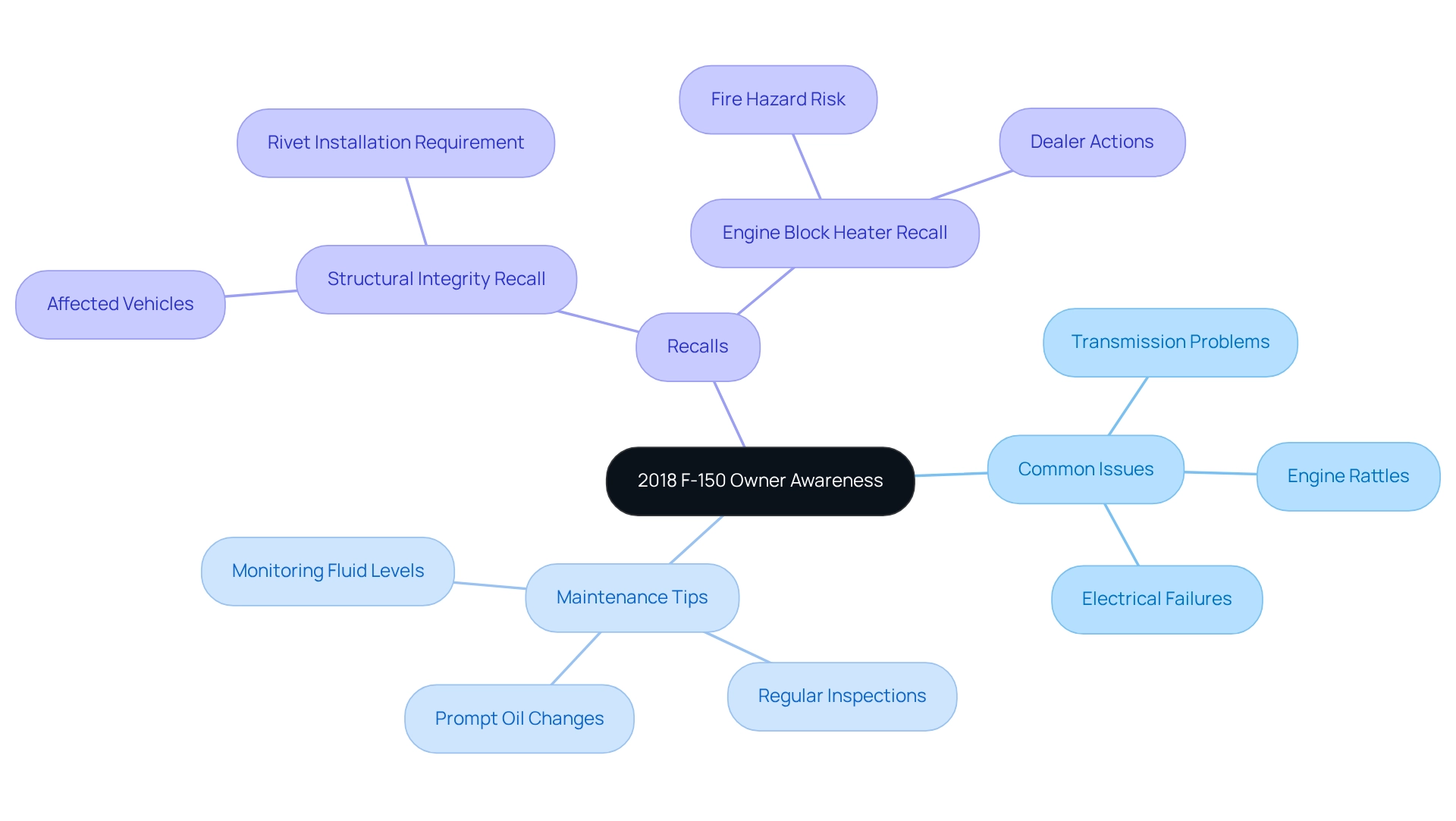
Conclusion
Understanding the common issues faced by 2018 Ford F-150 owners is essential for maintaining the vehicle’s performance and safety. Key challenges include:
- Transmission troubles, such as hard shifts and slipping gears
- Engine problems like excessive oil consumption
These issues can significantly impact the driving experience. Additionally, concerns with the electrical system and grinding noises from the front end underscore the importance of regular maintenance and timely interventions to prevent further complications.
Awareness of recalls and lemon law protections is crucial for owners who may encounter persistent problems. Staying informed about safety notices and potential recalls can help mitigate risks and ensure that necessary repairs are addressed promptly. Documenting repair attempts is vital for those considering lemon law claims, as this evidence can support their case and lead to possible compensation.
By adopting a proactive approach to vehicle maintenance and remaining vigilant about common issues, 2018 F-150 owners can enhance their driving experience and safeguard their investment. Regular checks, timely repairs, and thorough documentation can make a significant difference in ensuring the reliability and safety of this popular truck. Ultimately, informed ownership fosters a more satisfying and secure driving experience for all F-150 enthusiasts.
Frequently Asked Questions
What are the common issues reported by drivers of the 2018 F-150?
Many drivers have reported experiencing hard shifts during gear changes, which present as noticeable jolts or delays. Other issues include grinding sounds from the front end, particularly near the wheel bearings or 4WD hubs, and a soft brake pedal, especially in early models.
What causes hard shifts in the 2018 F-150?
Hard shifts are primarily linked to problems with the 10-speed automatic transmission. Routine maintenance and timely software updates from Ford can help alleviate some of these issues.
How prevalent are hard shifting problems among 2018 F-150 owners?
Statistics indicate that many owners have encountered hard shifting challenges, leading to an increase in personal lemon law claims. Reports show that some vehicles experience these problems early on, even with low mileage.
What can drivers do to address hard shifting issues?
Drivers are encouraged to maintain a detailed log of their vehicle’s performance and seek assistance from a qualified technician if they notice persistent hard shifts. Regular maintenance and software updates are also advised.
What should owners look for regarding grinding sounds in the 2018 F-150?
Owners should remain vigilant for unusual grinding noises, particularly during low-speed maneuvers or turns, as this may indicate underlying issues with the wheel bearings or 4WD hubs.
What are the potential repair costs associated with grinding noises in the 2018 F-150?
Repair costs for extensive issues, such as actuator failure in the 4WD setup, can average between $1,500 and $2,000. Early diagnosis and intervention are crucial to avoid these expenses.
What issues are associated with a soft brake pedal in the 2018 F-150?
A soft brake pedal can be caused by air trapped in the brake lines, insufficient brake fluid, or complications with the master cylinder. Regular brake system maintenance is important to ensure optimal performance.
How many Ford truck users have reported concerns about the soft brake pedal?
Approximately 30% of Ford truck users have reported similar concerns related to the soft brake pedal in 2018 F-150 models, highlighting the need for the company to address these braking problems promptly.





